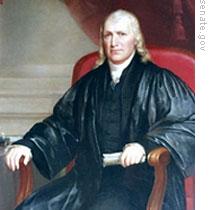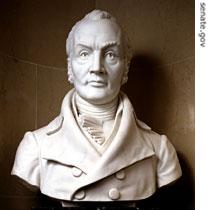VOA慢速英语-THE MAKING OF A NATION - US History Series: A Suprem
时间:2018-12-07 作者:英语课 分类:VOA慢速英语2008年(六)月
Samuel Chase used the courtroom as a place to attack President Jefferson's policies. Vice 1 President Aaron Burr led the trial as chief officer of the Senate. Transcript 2 of radio broadcast:
25 June 2008
Welcome to THE MAKING OF A NATION – American history in VOA Special English.
We talked last week about the presidential election of eighteen hundred and four. Thomas Jefferson, the nation's third president, was easily re-elected. He was head of the Democratic-Republican Party, known today as the Democratic Party. His political opponents were called Federalists.
Now, Doug Johnson and Richard Rael begin the story of his second term as president of the United States.
(MUSIC)
VOICE TWO:
Jefferson had a very good record during his first term as president.

The Louisiana Purchase Treaty was signed in Paris on April 30, 1803
He ended many taxes. He paid government debts. And he gained possession of the huge Louisiana Territory from France without going to war. The Federalists were sure he would win the election of eighteen-oh-four. Still, they were surprised by the strength of his election victory.
VOICE ONE:
Jefferson won one hundred sixty-two electoral votes. His opponent, Charles Cotesworth Pinckney, won just fourteen. The Federalists had expected Pinckney to get about forty.
Jefferson received support even in the Northeast. That is where the Federalists had their greatest strength. What was the explanation?
One man tried to explain the meaning of Jefferson's great victory. He was John Quincy Adams, son of former president John Adams. President Adams had been a firm Federalist. This is what his son said:
VOICE TWO:
"The power of Jefferson's administration rests on a strong majority of the American people. The president has great popular support. His re-election shows that the experiment of the Federalists has failed. It never can and never will be brought to life again. To try to bring it back would be foolish. It would be like trying to put life into a body that has been buried for years."
After the election of eighteen-oh-four, only seven Federalists remained in the United States Senate. Only twenty-five remained in the House of Representatives.
(MUSIC)
VOICE ONE:
The Federalists no longer controlled the Congress, although they still controlled the courts. Many judges had been appointed during John Adams's last days as president. These judges opposed Thomas Jefferson. Some used the courtroom as a place to attack his policies. Judges were not supposed to make political speeches in court.
One of the most powerful anti-Jeffersonian judges was Samuel Chase. He was a member of the Supreme 3 Court.
VOICE TWO:
Samuel Chase was from the state of Maryland. He was active in local and national politics for a long time. He had signed America's Declaration of Independence from Britain. He had served in the Continental 4 Congresses that governed America during and after its Revolutionary War. Yet he did not agree with all parts of the United States Constitution. When the Maryland legislature voted to approve or reject the Constitution, he voted against it.
VOICE ONE:
Samuel Chase was not a republican: he believed that Americans should not have the same rights. For example, he believed that all citizens should not have the right to vote. He said this would lead to mob rule. He declared that great trouble would come to the government if common people had the same rights as educated people who owned property.
President Jefferson heard about Chase's statement. He told a member of Congress that he was concerned. Jefferson asked: "Should this judge's attack on the ideas of our Constitution go without punishment? The public will look to Congress to take the necessary action against him."
(MUSIC)
VOICE TWO:
During the last months of Jefferson's first term as president, the House of Representatives began discussing the possibility of removing Justice Chase from the Supreme Court.
A committee was named to investigate. The committee decided 5 that there was enough evidence to bring him to trial before the Senate. The full House agreed. The impeachment 6 trial was to begin in February, eighteen-oh-five.
VOICE ONE:

The impeachment trial of Supreme Court Justice Samuel Chase forced the Senate to explore the meaning of impeachable 7 crimes
The judge in the trial was the chief officer of the Senate, Vice President Aaron Burr. Burr would decide what evidence could or could not be heard. His actions would have great influence over the final decision.
Both Federalists and Republicans watched Burr closely during the trial. Both groups looked for some sign of support. Burr gave none. No one found any reason to criticize his actions.
VOICE TWO:
The Senate heard testimony 8 for a little more than three weeks. Then it voted on each of the eight charges against Justice Chase. A two-thirds vote was needed to declare him guilty. None of the charges received the necessary two-thirds vote. The impeachment had failed. Samuel Chase could not be removed from the Supreme Court.
President Jefferson had hoped that Chase would be found guilty. He did not get this wish. But, after the trial, Chase no longer used the courtroom for political purposes.
(MUSIC)
VOICE ONE:
A few days after the impeachment trial ended, Thomas Jefferson was to be sworn in as president for a second term. In those days, the inauguration 9 of the American president was held in March, not January.
Aaron Burr would not be serving with Jefferson again. The Republican Party had not supported him for vice president. Instead, it chose George Clinton, who had been governor of New York state. Before leaving office, Burr decided to make one last speech to the Senate.
VOICE TWO:
The senators were very interested in what Burr had to say. Even his political opponents sat up and listened. Burr told his friends goodbye. He said he might never see them again. Yet he said they could still join together in defending freedom and social justice.
He spoke 10 of the senators' great responsibility to protect liberty, the law, and the Constitution. "If the Constitution is ever destroyed," he said, "its final breaths will come on this floor."
VOICE ONE:

Aaron Burr by Jacques Jouvenal
Aaron Burr faced a future full of questions. He had lost all political power. He owed large amounts of money. He could not return to his home in the New York area. He would face criminal charges there as a result of his duel 11 with Alexander Hamilton. Burr had shot and killed Hamilton in the duel.
At the end of March, eighteen-oh-five, Burr wrote to his daughter. "In ten or twelve days," he said, "I shall be on my way west. The trip may lead me to New Orleans, perhaps even farther."
He also wrote to his daughter's husband. He said he would not return home. "In New York," he wrote, "I would lose my freedom. In New Jersey 12, I would be hanged. So, for the present, I will not take a chance."
VOICE TWO:
What would Burr do instead? For more than a year, he had thought about a secret plan. Details are not clear, because he said different things to different people. But history experts say the plan involved an attempt to seize Mexico from Spain.
Burr could not keep his plan a secret from everyone. He needed help. He worked with two men. One was Jonathan Dayton, a former United States senator. The other was James Wilkinson, military governor of the Louisiana Territory.
VOICE ONE:
Burr also needed money. He got some from his daughter's husband. And he got some from a man in Ohio named Harman Blennerhassett. Mister Blennerhassett had become rich after coming to America from Ireland.
History experts say Burr tried to get help from Britain, too. Burr told the British ambassador in Washington that he wanted money and ships to create a new country. It would include Mexico and several western states. The states would be split away from the Union.
VOICE TWO:
The British ambassador liked Burr's plan. He told Burr that he would urge his government to support it. It would take at least four months, however, for the ambassador to communicate with his government in London. Burr decided not to wait for an answer. He began his trip to the West. That will be our story next week.
(MUSIC)
ANNOUNCER:
Our program was written by Frank Beardsley and Christine Johnson. The narrators were Richard Rael and Doug Johnson. Join us each week for THE MAKING OF A NATION – an American history series in VOA Special English. Transcripts 13, podcasts and MP3s of our programs can be found at voaspecialenglish.com.
- He guarded himself against vice.他避免染上坏习惯。
- They are sunk in the depth of vice.他们堕入了罪恶的深渊。
- A transcript of the tapes was presented as evidence in court.一份录音带的文字本作为证据被呈交法庭。
- They wouldn't let me have a transcript of the interview.他们拒绝给我一份采访的文字整理稿。
- It was the supreme moment in his life.那是他一生中最重要的时刻。
- He handed up the indictment to the supreme court.他把起诉书送交最高法院。
- A continental climate is different from an insular one.大陆性气候不同于岛屿气候。
- The most ancient parts of the continental crust are 4000 million years old.大陆地壳最古老的部分有40亿年历史。
- This gave them a decided advantage over their opponents.这使他们比对手具有明显的优势。
- There is a decided difference between British and Chinese way of greeting.英国人和中国人打招呼的方式有很明显的区别。
- Impeachment is considered a drastic measure in the United States.在美国,弹劾被视为一种非常激烈的措施。
- The verdict resulting from his impeachment destroyed his political career.他遭弹劾后得到的判决毁了他的政治生涯。
- Thus, Congress cannot remove an executive official except for impeachable offenses. 因此,除非有可弹劾的行为,否则国会不能罢免行政官员。 来自英汉非文学 - 行政法
- The government officer committed an impeachable offence. 那位政府官员犯了可能招致弹劾的罪行。 来自辞典例句
- The testimony given by him is dubious.他所作的证据是可疑的。
- He was called in to bear testimony to what the police officer said.他被传入为警官所说的话作证。
- The inauguration of a President of the United States takes place on January 20.美国总统的就职典礼于一月二十日举行。
- Three celebrated tenors sang at the president's inauguration.3位著名的男高音歌手在总统就职仪式上演唱。
- They sourced the spoke nuts from our company.他们的轮辐螺帽是从我们公司获得的。
- The spokes of a wheel are the bars that connect the outer ring to the centre.辐条是轮子上连接外圈与中心的条棒。
- The two teams are locked in a duel for first place.两个队为争夺第一名打得难解难分。
- Duroy was forced to challenge his disparager to duel.杜洛瓦不得不向诋毁他的人提出决斗。
- He wears a cotton jersey when he plays football.他穿运动衫踢足球。
- They were dressed alike in blue jersey and knickers.他们穿着一致,都是蓝色的运动衫和灯笼短裤。
- Like mRNA, both tRNA and rRNA are transcripts of chromosomal DNA. tRNA及rRNA同mRNA一样,都是染色体DNA的转录产物。 来自辞典例句
- You can't take the transfer students'exam without your transcripts. 没有成绩证明书,你就不能参加转学考试。 来自辞典例句